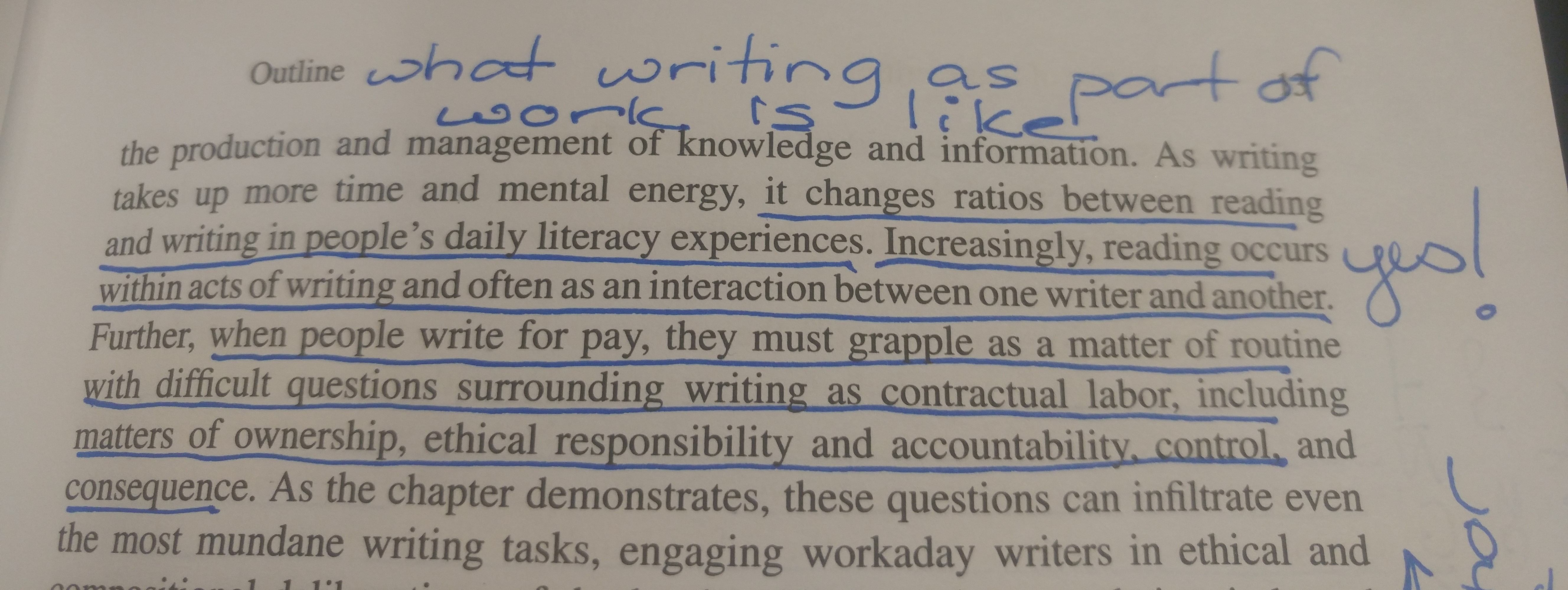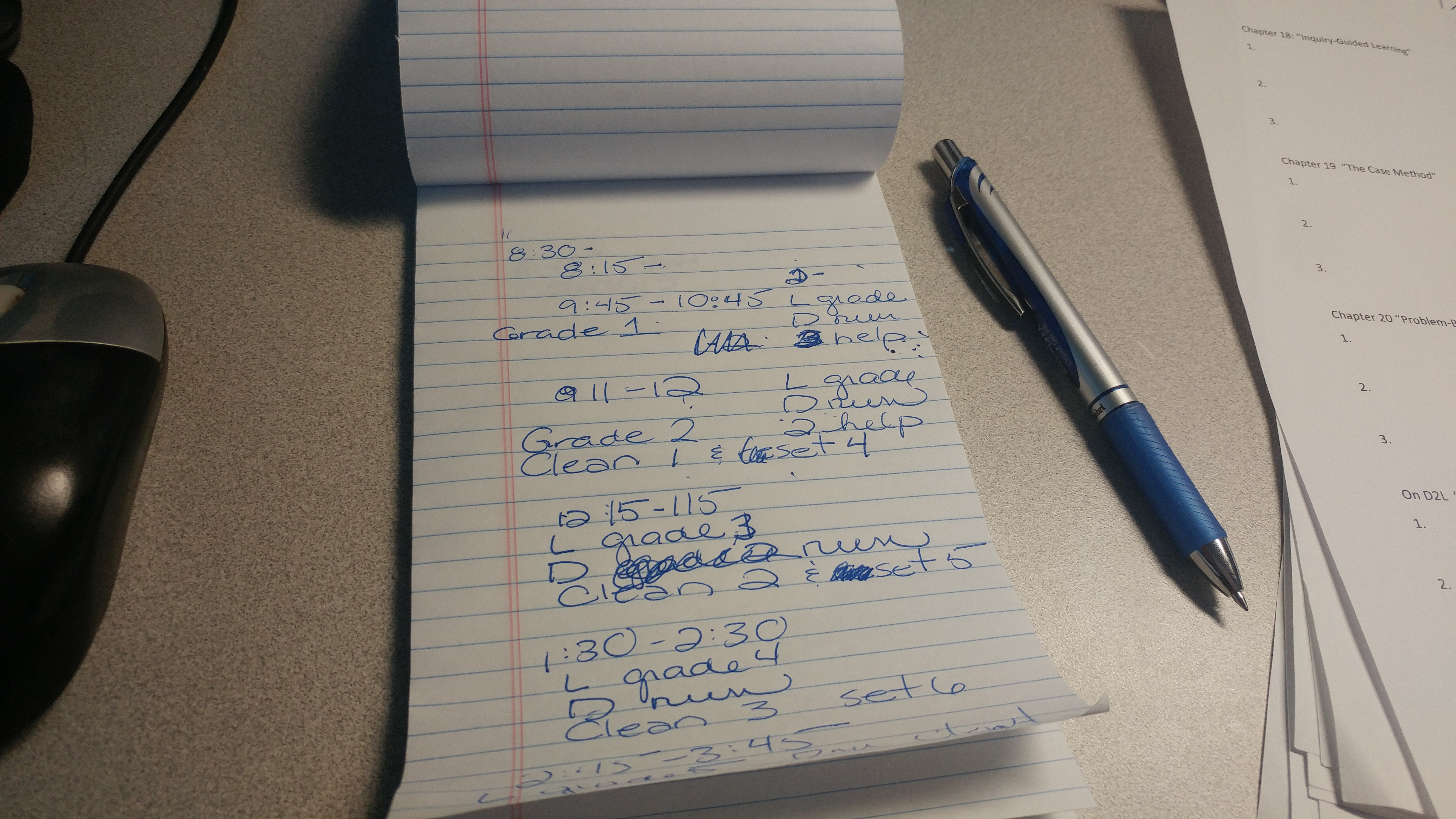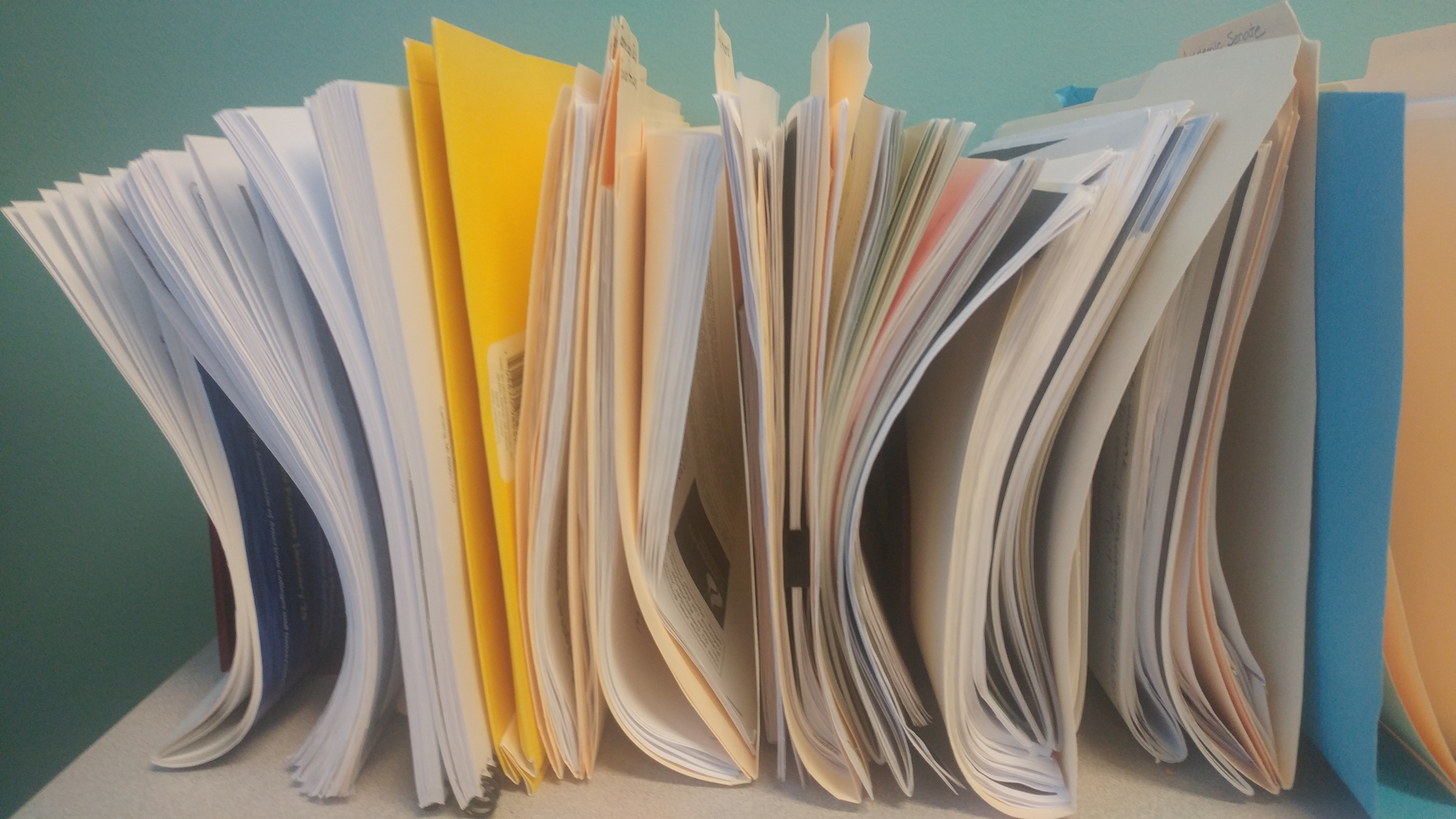Beginnings
Within the first few pages of Deborah Brandt’s The Rise of Writing, I found myself saying, “This is my life.” Brandt argues, “As writing takes up more time and mental energy, it changes ratios between reading and writing in people’s daily literacy experiences. Increasingly, reading occurs within acts of writing and often as an interaction between one writer and another. Further, when people write for pay, they must grapple as a matter of routine with difficult questions surrounding writing as contractual labor, including matters of ownership, ethical responsibility accountability, control, and consequence” (12). And this is how I responded to that passage:
As I sat down to finish reading Brandt’s text last night, I immediately began to worry what I was going to say about the text in my discussion post for ENG-W682 at Indiana University-East. After a while, I felt stuck over what I wanted to say, and my reading slowed. I became frustrated and instead pulled out my phone and read The Guardian. I browsed a couple of articles. Then I read one that ticked me off, and I posted it to Facebook. Almost immediately, a friend posted a link to another article, which I went and read.
That was a moment of clarity for me. I had skimmed, but I had read. I wrote and was read. Someone responded to my writing, and I read some more. Most importantly, I learned something important to me that I didn’t know when I started.
I have long understood Nicholas Carr’s concern that the internet has divorced us from our ability to read deeply, that it is “chipping away [our] capacity for concentration and contemplation.” I could see his point, but I held out hope that there was another way. Reading Deborah Brandt’s The Rise of Writing has led to consider that writing is truly now the dominant literacy–and just maybe writing is the key to get people reading again.
Thinking back to my initial impression of the book, I decided to keep a 24-hour literacy journal. I would write down my writing and reading activities for the day, largely my time at work. I can only give the highlights here, but I found myself confirming Brandt’s findings.
Leslie’s Literacy Journal
9:15 AM I responded to an email from a faculty member who needed to make some contacts with other faculty members about an issue. I responded with three names, but instead of simply writing out the email address, I created hyperlinks using each of the names. I realize that this takes a bit of technological literacy.
9:48 AM I’m technically in office hours, and a student initiates a chat in my YouSeeU room in Desire2Learn. As part of our conversation, I have to refer to the course schedule that I wrote before the semester started. I composed this document mostly for the students, but I also find it regularly useful.
10:10 AM I use Google Hangouts to chat with my lead support in the Center for Teaching Excellence (CTE). She is on maternity leave, but I need her expertise on a matter; this is the quickest way to contact her.
10:30 AM One of my faculty fellows comes to talk to me. She wants to present the CTE Teaching Innovations blog and online Ideas Bank at her department meeting on Friday. Two “sections” of the Ideas Bank do not yet have cover photos. I use Facebook messenger to contact the system administrator and ask him to add photos. At this point it hits me: I have just used three different messaging systems to write to three different audiences, and my decisions were based on my professional relationship with the person.
10:36 AM I am still trying to get through my email for the day. A student lets me know that she will miss two class days since she is having surgery. She needs to know what would be the best days to miss. I again refer to something that I wrote before the semester started. This document is for an audience of one: me. Called “lesson plans,” it helps me to negotiate between the f2f and online portions of my hybrid Composition II class.
10:48-11:18 AM Last major bit of email business. The director of the Michigan Science Olympiad needs some information from me about the event that I will supervise, Write It Do It, on April 29. They are expanding the tournament to 90 teams this year, and I need to work out some logistics and get back to him and his student coordinators. I work out the logistics by hand on a notepad I keep next to my computer; then I email the information to both him and his student coordinators.
11:20 PM I catch up some reading from Faculty Focus and Insider Higher Ed. I end up tweeting out three articles to the CTE account.
11:40 AM I am called into the CTE Tech Support Room to help one of our Paralegal faculty members. She must find a way to print out the online tests the students take and send them to the State of Michigan. In this case, I need to employ some of the Desire2Learn literacy that I possess.
12:00 PM I again ignore revising an important email that I must send to another department head, who is much, much younger than I am. I have to ask her to revise a flyer for an event we are co-sponsoring. I am leery of some verbiage that she has used to describe the event. I want to support what she is doing in organizing this event, but I also realize that our faculty could misinterpret the CTE’s role in the event. One of my faculty fellows has read the email once for me, but I still want to rework how I am phrasing my response.
12:32 PM I am again called into the Tech Support Room so that I can help my Paralegal faculty member. This time she needs help printing out the course evaluations so that they can also be submitted to the State.
1:00 PM My part-time support staff member reads the email I’m troubling over to check over my latest revisions. She thinks it sounds good, so I hit the send button. I am really missing my lead support staff at this point. She is a talented editor, and especially good at crafting tough messages in a kind way. “One more week,” I remind myself.
1:10 PM I hand write four thank you notes concerning the Adjunct Appreciation Event we held on Wednesday: One each for LCC’s president and provost who attended the event and one each for the adjunct faculty members who shared their “Why I Teach” stories with those assembled. I make sure the notes to the provost and president are formal. I check the spelling of “Prystowsky” three times because I’m nervous about misspelling the provost’s name. I consider one of the faculty members a friend, so I simply sign “Leslie.” On the other three cards, I use my full name.
1:40 PM While picking up some printing from the copier, I chat with one of our CTE regulars. We somehow get into a conversation about the Steely Dan song, “Go Back Jack.” He explained that as a younger man, he thought the lyrics went, “In the morning you go gunning for the man who stole your woman.” I replied that I always thought it was “for the man who stole your wallet.” When I’m back in my office, I go to the SongFacts website and look up the lyrics and the story behind “Go Back Jack.”
1:55 PM I send a quick email to the two adjunct faculty members who I pay to organize the adjunct events to inform them that I have sent out “real” thank you notes. Within minutes, one pops his head into my office and says, “Great idea!” A couple of minutes later an email arrives from the other saying, “Great idea!”
2:15 PM I attempt to fill out a form to have the PC Tech group complete some updates on the iMac in our Tech Support Room. I am extremely grateful when our web designer and computer guru, just having returned from lunch and work-related errands, completes the job for me.
2:20 PM I write a recommendation letter for one of my adjunct colleagues in the English Department. I have to text her with a couple of questions.
3:10 PM I begin the arduous task of completing a “Budget Reallocation Request” so that I can have one of my faculty fellows permanently assigned to the CTE. The form is really an Excel spread sheet. It asks for ID numbers that I don’t have and uses jargon that is unique to our finance department. The only easy part is where I must use actual words to write my justification for this request and explain how it aligns with the college mission statement. I call my budget liaison and leave a message. I never do receive a call back and leave at 5 o’clock feeling rather stupid about my financial literacy.
Conclusions
So what did I learn by tracking my literacy experiences during the day? A lot. Too much to go into here.
Mostly, I was able to confirm Brandt’s claim in The Rise of Writing with my firsthand experience. In the process, several of Brandt’s themes came through.
First and foremost, I was shocked at how many different audiences I write to in one day: students, faculty colleagues, my administrators, my staff, other support staff, other department leaders, people outside of my institution, myself. It was mind-boggling. I might not be “code switching” in the strict sense of drifting between two languages in one conversation. However, I am clearly able to switch my tone, diction, sentence structure, everything in an instant, depending upon who I am writing to and why I am writing to them.
The care that I took with the thank you notes to my president and provost was especially telling. Brandt states, “Some of the most acute thinking about other writers occurs in relationships of power and control, especially between superiors and subordinates in the workplace…In these cases, knowing how other writers think can keep you out of trouble” (143).
My experience with the email that I had trouble writing clearly indicated to me that when I write at work I represent Lansing Community College. In my director role, I clearly represent the Center for Teaching Excellence to the rest of the college. I want and need to do what is best for those institutions.
That same troubling email let me know how much I depend upon other writers to ensure the best possible product. “Reviewing other people’s workplace writing is a ubiquitous practice,” Brandt explains, “whether as a formal job responsibility or as an informal favor extended to colleagues, supervisors, or even in some cases friends and family members” (143). To us in the CTE, it standard operating procedure. We want our best work to go out, and we realize that we need “practice readers” to ensure that happens.
My experience definitely echoes Brandt’s conclusion about writing in one’s job: “…workplace writing will always be assumed to represent the organization from which it emanates–its corporate interests, positions, image, voice–and not the individual who stand in to do the writing” (59). Still, in everything I do at work, I can still perceive my own voice and thoughts; they’re just buried in a professional veneer. I easily feel the paradox of the “authorial residue” that Brandt describes (51). As she points out, there truly is a “residue of authorship, a value that can be neither separated from their person nor accounted for in any legal or economic sense” (27). The output may not belong to me, but I still feel as if that the finished work is a part of me.
Also, I was amazed at the vast array of media that I used: email, phone texts, pen and paper, word processing, three different chat programs, Twitter, Facebook, and (as I write) WordPress. On top of all that, I was using Desire2Learn to communicate with my students as well as helping others to do the same. I now understand Keller more clearly when he says, “This is the paradox of contemporary literacy: as opportunities expand for how we can receive and communicate ideas, that expansion creates an ongoing challenge to adapt, to (re)situate ourselves as users of literacy among reconfigurations of old, current, and new literacies” (6).
Most of all, I walked away from my 24 Hours of Literacy believing that I function not just in a web of writers but a web of readers as well. Brandt’s definition of “reading” is very applicable here: “the common sense notion of taking up words that have been written down by someone else” (92). I wrote with the intention that my words to be read; I had to get my messages out. Others had to write so that I could read and receive their message. In this sense, I become more and more convinced that electracy is somehow an extension of oral culture; it is simply relocating conversation into the digital realm.
Finally, I turn to back to my work desk and the pile of journal articles I have collected and have wanted to read for my job for quite some time.
I agree with Brandt: Deep writing has taken over for deep reading as the dominate literacy (160). Therefore, I also agree with Keller: Composition instruction needs to again find a way to reinsert reading into its pedagogy (1). For myself, I am hoping to find a way to work backwards from what has been traditionally done, privileging reading and text consumption as a means to get at writing. If Brandt is correct, I’m hoping that we can find a way to work from writing back to reading (much like I did with my Facebook post that started this whole adventure).
Works Cited
Brandt, Deborah. The Rise of Writing: Redefining Mass Literacy. Cambridge, UK: Cambridge UP, 2015.
Carr, Nicholas. “Is Google Making Us Stupid?” The Atlantic July/August 2008. Web. http://www.theatlantic.com/magazine/archive/2008/07/is-google-making-us-stupid/306868/
Keller, Daniel. Chasing Literacy: Reading and Writing in the Age of Acceleration. Boulder, CO: Utah State UP, 2014.







First of all, I LOVE The Guardian, it is part of my morning reading ritual along with NPR, The Atlantic, Smithsonian, Quartz and a few other sites (Washington Post, NYTimes, Faculty Focus, Chronicle, etc).
Ok, so as I read your kick-@ss blog post a couple of things came to mind. Writing is a form of acting/doing (in that it is the basis of communication) and also a way of processing/thinking (in that we consider, reflect, etc). Could we say the same of reading? (hold that thought for a moment) I think this is kind of at the heart of Brandt’s book, don’t you, and one reason why writing has gained such significance and attention. In fact, I see that you came to a similar conclusion:
“I was able to confirm Brandt’s claim in The Rise of Writing with my firsthand experience. In the process, several of Brandt’s themes came through.”
But your conclusion also really struck me in terms of reading:
“I walked away from my 24 Hours of Literacy believing that I function not just in a web of writers but a web of readers as well. Brandt’s definition of “reading” is very applicable here: “the common sense notion of taking up words that have been written down by someone else” (92). I wrote with the intention that my words to be read; I had to get my messages out. Others had to write so that I could read and receive their message. In this sense, I become more and more convinced that electracy is somehow an extension of oral culture; it is simply relocating conversation into the digital realm.”
So this led me to consider reading as a form of listening/processing. Writing and communication is the contemporary oral act in light of technological development and reading/listening is the consumption of that orality. But what good is writing and communication if our audiences can’t make sense of it…on multiple levels? I love teaching literary analysis precisely because it helps us read more deeply and to examine ideas through various lenses. As such, reading is more than just the consumption of ideas but the path to consideration and comprehension. So my “hold that thought” above is that indeed both writing and reading allow us to process the message. Writing is visible, but reading is invisible. Writing is tangible, reading is intangible. Writing can be shared, disseminated and translated. How about reading? I wonder how the cognitive processes involved in these tasks and the concept of visibility has shaped our conversations about reading and writing and the current ways in which we privilege writing over reading…
End of my cognitive vomit, lol. It was great reading you!
Marlen : )